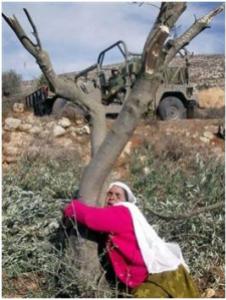By Lily Hoffman Simon
When Noah’s ark ended its forty day journey, Noah sent forth a dove, which returned to him with an olive branch. The olive branch indicated the end of the flood and reappearance of land, and symbolized the restoration of justice to humanity (Genesis 8). Since then, the olive branch has become a symbol of peace in the Jewish and Western traditions. But recent history concerning olive trees in the West Bank seems to contradict this peaceful association.
First, a little history is necessary. Israel captured the West Bank from Jordan in 1967. The Palestinian inhabitants of the territory are not Israeli citizens. Some areas of the West Bank are entirely under Israeli control, while other areas have an autonomous Palestinian governmental body. However, Israeli settlements in the West Bank impede the development of Palestinian autonomy. Amidst this complicated political and territorial situation, olive trees have unexpectedly emerged as a tool of land appropriation.
In the West Bank, where the question of who “owns” plots of land is legally murky, the person using and tilling the land usually receives default possession. As a result, Palestinians in the West Bank can hold on to more land by planting olive trees. Settlers claiming Biblical sources as their deed to the land respond by planting trees of their own.
Yet the saga doesn’t end there. The olive rebellion has turned into a bloody feud, as Jewish settlers have responded to the Palestinian olive trees with torching, uprooting, and violence. The human rights organization Yesh Din has reported 69 accounts of damage to Palestinian trees in the past 4 years, acts that result in economic decline, environmental deterioration, humiliation, and even physical harm to Palestinians.
The olive tree is central to Palestinian rituals, historical agricultural practice, and economic growth through the production of olive oil. In this light, Palestinian tree-planting can be viewed as both a cultural and political act by the Palestinians. But the prominence of olive trees throughout the Israeli landscape presents the importance of the tree to the Jewish tradition as well. In the parallel plantings, it is apparent that the olive trees are not simply about land appropriation, but also ethnic devaluation of both Israelis and Palestinians.
The complications concerning olive trees in the West Bank degrade the importance of an international symbol – the olive branch itself. The tree’s connotation is sadly transforming into one of power struggles, violence and ethnic conflict instead of peace and justice. However, there is some hope, given the development of peace and community initiatives that maintain use of the olive tree as a positive symbol (examples include The Olive Tree Initiative, and even the infamous Dr. Bronner’s soap which uses olive oil from joint Israeli-Palestinian production). Despite the symbol’s newfound defamation, the olive branch may yet be reclaimed as a sign of peace. Before that can fully happen, the olive branch’s place in Middle Eastern ethnic life must be respected.


One thought on “The Olive Conflict”